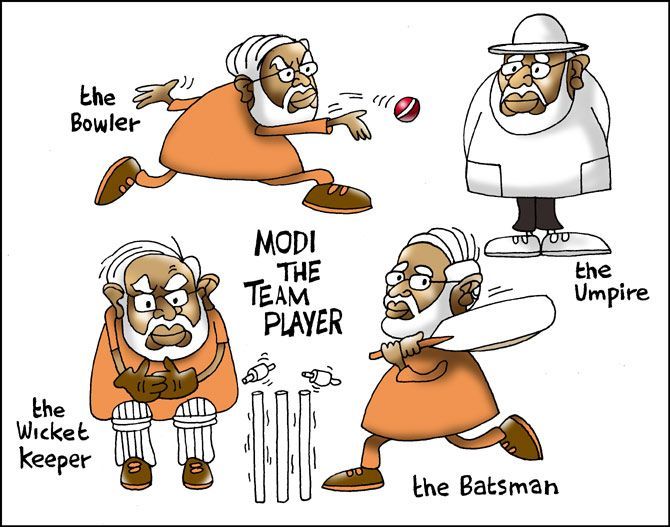'Nationalism built on divisiveness cannot strengthen the country, or help the economy improve its performance,' points out T N Ninan.

Illustration: Uttam Ghosh/Rediff.com
After the paralysis of the last years of Manmohan Singh as prime minister, the four years of Narendra D Modi have been almost hyper-active.
What has been achieved by this burst of energy?
In a country with many poor people, the primary economic issues are growth and reaching the benefits of that growth to those at the bottom of the pyramid, in an environment of macro-economic stability.
One can also look at specific programmes to see how well they have done.
Growth has been somewhat less than in the five years of the second Singh government, especially after adjusting for the boost to more recent numbers provided by the revised method of calculating GDP.
The government's focus on last-person inclusion has addressed some forms of inequality, but the picture on employment growth must await more comprehensive data.
As for macro-economic management, the sharp drop in oil prices helped narrow the trade gap, reduce the fiscal deficit and lower the rate of inflation.
All three are under threat now as oil prices go back up the charts.
The government comes through quite well, by and large, on the implementation of most of its flagship programmes.
It has either delivered or is well on its way to achieving near-universality on financial inclusion, electricity supply, cooking gas availability, road connectivity and freedom from open defecation.
The question is how much of a difference these and others like subsidised housing have made to the lives of citizens.
Are the Jan Dhan bank accounts operational, is electricity actually reaching homes, and are empty cooking gas cylinders being replaced at the promised subsidy price? Meanwhile, last-mile Internet connectivity remains a weak link.
If that suggests a verdict of 'Yes, but...', there are more candidates for that response.
Aadhaar is the obvious case as it has provided options for benefit transfer schemes, but it is the subject of intense debate and awaits a court judgment.
There is surplus capacity in both power (where a reform package has failed to improve sector viability) and ports -- but both point to insufficient demand.
One hears less about the difficulties of doing business in India, other than on the tax front, but capital inflows have eased up.
The government gets credit for ramping up on renewable energy and investing massively in the under-invested railways, while delivering a stepped-up highways programme.
As for 'Make in India', the needle has not really moved on the share of manufacturing in GDP, while one hears next to nothing about the skills programme.
When it comes to policy, the government is rightly criticised for its failure to address key reform issues that would have made for more efficient use of the factors of production.
But the fact also is that the bankruptcy law was passed early on. The new framework for monetary policy and new pricing policy for petroleum products were also significant early initiatives.
The goods and services tax, though marred by its many unhappy compromises, ranks alongside the movement towards lower tax and tariff rates in the 1990s as watershed reform of the tax system.
The worry points have to be trade and banking.
The prolonged and probably unprecedented stagnation in non-oil merchandise exports begs questions with regard to trade policy and the inadequacy of domestic reform when it comes to building competitiveness.
As for the government-owned banks, the bottom of the pit is yet to be reached.
The problem has a lot to do with legacy issues and the enforcement of more transparent accounting, but it also has to do with insufficient action for improving the banks' business practices, internal structures, risk assessment capabilities and quality of management.
Four years should have been enough for the government to show improvement.
The real negatives are not with regard to the economy, and have to do with the undermining of key institutions and damage to the social fabric because of attacks (verbal and physical) on disadvantaged groups.
Nationalism built on divisiveness cannot strengthen the country, or help the economy improve its performance.











